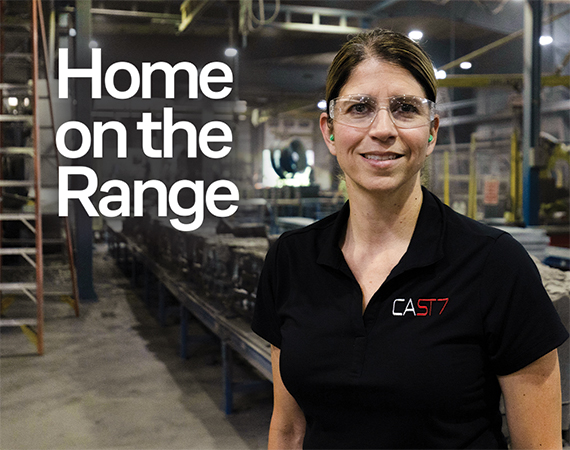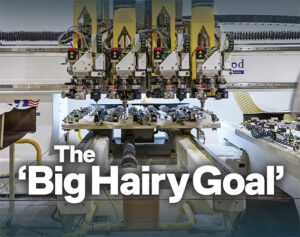Although she didn’t grow up in Minnesota and came to manufacturing by an unconventional route, Laura Rusich is making a strong impression on the Iron Range. Now general manager of Hibbing-based Cast7 — which designs and produces high-performance castings for iron ore pelletizing plants — Rusich draws on her deep experience in financial services, her grasp of manufacturing systems, and her expertise in optimization to help the company grow responsibly, with a focus on ethics and environmental stewardship.
From agriculture to accounting practices
Rusich grew up on a family farm in Kansas, with a mother who’s a nurse and a father who’s a farmer. She didn’t consider taking over the family business, but she was intrigued by the conversations she heard when her dad would take her along to discussions with bankers and other farmers, where they talked about business deals.
“As I got older, I realized the importance and the nuances of all these business relationships, and how they intersected,” she says. “I could see how one transaction would impact other aspects of the business. That felt very analytical to me, and it was appealing because that’s the way my mind works. That’s what led me to choose accounting as a profession.”
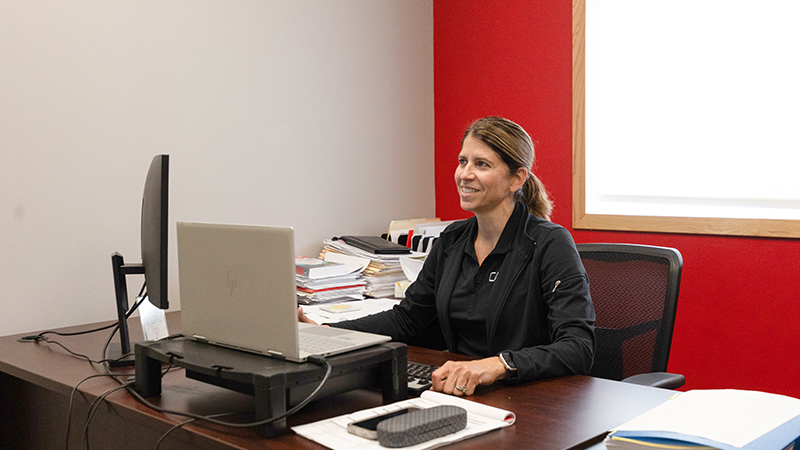
Rusich received her bachelor’s degree in accounting from Kansas State University in 1992 and then became a CPA, joining KPMG in the audit division right after graduating. The company is a global organization of independent service firms that provide audit, tax, and advisory services. Working on the audit side, she was immediately exposed to the business practices of numerous industries including health care, banking, and manufacturing. After six years in the Kansas City office, Rusich took an assignment in Zurich, Switzerland for a year and a half to work on a project for Credit Suisse.
The combination of seeing the inner workings of different companies and navigating another country’s culture expanded her knowledge of business transactions and connections, and how people interact in various says, she says.
“When you’re addressing so many industries, you get to work with a variety of people and learn from them,” she adds. “You certainly realize that every industry has unique challenges and advantages, and there are some commonalities but there are also many rules — spoken and unspoken — to specific industries. That’s the kind of understanding that I feel created foundational awareness for me, that I was open to learning about how each industry operated, and how it could be optimized.”
After Zurich, Rusich joined the KPMG Minneapolis office as a senior manager in the commercial practice, where she was involved in all aspects of audit activities, including staffing, SEC filings, billing, fee negotiation, and Sarbanes-Oxley compliance. She focused on venture capital, including both medical technology startups and traditional manufacturing companies. Rusich also met her husband at that time, and in 2007 he suggested moving to Hibbing, where he grew up, and where they could raise their two young children.
After 15 years in public accounting, she moved to northern Minnesota and wasn’t sure what her career pivot would be. After all, the majority of her career was auditing large, publicly-traded companies and those weren’t exactly in abundance in Hibbing. To get an understanding of the area and use her skillset, she began doing contract accounting and auditing work for a number of local companies, including auditing the city of Hibbing and doing consulting for nearby colleges. She also worked for the Virginia Eveleth Economic Development Authority, where she oversaw the public board, provided marketing services, and negotiated lease contracts.
“We had low-cost commercial facilities, and you could get a favorable rate if you were a company needing economic development assistance, which was a way to draw more business to the area,” Rusich says. “Through that experience, I got to know numerous contacts in the Iron Range Resources and Rehabilitation, a state economic development agency.”
She also established a reputation as a thoughtful, analytical thinker who could apply growth-oriented business practices to numerous industries. Along with raising children in the area, she did consulting work for a breadth of companies, which helped her get a foothold in Hibbing and became an important aspect of her personal and professional success.
“People always say it’s hard to meet people in the Iron Range, but honestly, I have to say that it’s how you go into it,” she says. “If you’re outgoing and you work hard at meeting people, you’ll establish those relationships. I did draw on my experience in Zurich, where I didn’t know anyone and didn’t speak the language. I think if you can make friends in a place like that, you can fit in anywhere. Also, through all the contract and consulting work I did, I ended up making a significant number of connections in the business community, and that came into play for my next step.”
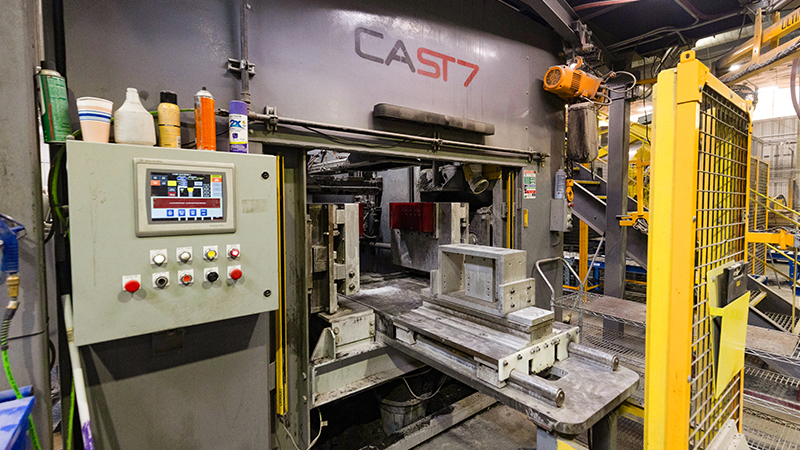
Small town, big connection
The next pivot for Rusich illustrates the value of getting to know your neighbors. In trying to find land to build a home, she and her husband discovered it was difficult to find lots within the city for construction. But they did locate a parcel that someone was holding for development, so they hired a contractor. It turned out that the contractor was also working on a lake home for the person who owned the house right next to the couple’s new property — Tim Bungarden, president and CEO of Cast Corporation, a machine shop, castings, tooling, and pattern company.
“Not only were our lots next to each other and we had the same builder, but his younger son was often at events with our kids, so we all ended up talking to each other quite a bit and getting to know one another,” she says.
Those conversations turned toward what Bungarden needed at Cast, which was a CFO who could handle a breadth of duties, such as overseeing debt and equity financing packages, pricing analysis, product cost setting, financial reporting, audit support, and process improvement in reporting systems. Rusich checked all the boxes. She came on initially as a contract CFO in January 2012, just when Bungarden was looking to build a foundry, and over time her position evolved into Rusich’s current role as general manager.
“As he was heading toward fulfilling that long-term dream of a foundry, I was along from the beginning, as he got all of the loans and financing put in place,” she says. “He’d been operating Cast as a machine and pattern shop for about 20 years, and this was a big new venture. I was there through the whole construction and startup of that facility, and over the years, I saw it develop and get more of the local mines as customers. As that happened, we went through an evolutionary growth stage.”
Rusich found the entrepreneurial atmosphere to be invigorating. Although Cast was an established brand, the new venture had the feel of a startup, which she found fun — but only because she had the background to handle that.
“A startup is challenging because there’s no roadmap, there’s nothing to follow, and that can be intimidating for many founders, because you’re building it as you go,” she says. “Fortunately, I had so many years of public accounting and working in different industries, so I had a type of foundation and knowledge in place that made it enjoyable, not overwhelming.”
At the end of 2021, the company looked to establish a broader sales reach in order to keep progressing. That’s what led to the next stage of carving the foundry out as a separate business. With the newly established LLC, the business was renamed Cast7. Bungarden transitioned away as a different management structure was being put in place, and Rusich was tapped first as a senior finance manager to support the local management team, providing strategic and tactical business support.
In May 2023, Cast7 promoted her to general manager, which came with considerable oversight in terms of financial management, operational leadership, HR, and other functions. Rusich’s duties are both broad and deep; she does everything from ensuring compliance with financial regulations to implementing operational plans that foster a culture of continuous improvement. The company continues to expand in terms of product offerings, market reach, and employee numbers. When she joined, there were about 20 employees, and now it’s at nearly 50, she says.
From 2022 into 2023, Cast7 invested an additional $3 million into capital equipment to expand into additional product lines for area mines, resulting in larger orders and a broader market reach.
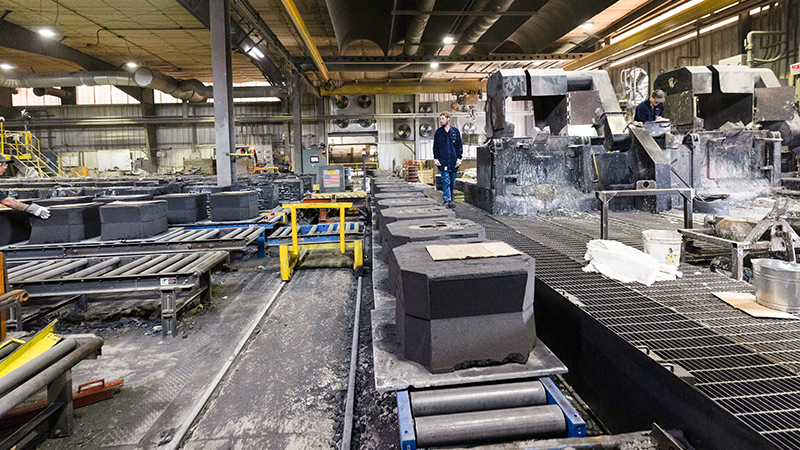
Looking forward
It’s not just the duties and her role that have changed since her KPMG days, she adds. Being at Cast7 has also resulted in a deeper emotional investment in her work, and the outcome that happens as a result.
“When it’s a small town and you know all your coworkers, you feel a lot more attachment to it,” Rusich says. “You even know people who are using the products in the local mines. That’s a huge shift.”
Moving from a purely financial role to general manager also caused a notable change in how she views her work, Rusich adds. She notes that taking on that larger role has actually made her better at financial functions because she’s involved in every facet of the operation, from production to sales.
“That makes me stronger in finance because when I go to put the financials together, I know everything that’s going on,” she says. “Before, I would get the information from Tim, but naturally it wasn’t as detailed as what I have now. Also, I have a much better understanding now of all operations, so that makes it more interesting.”
Another enjoyable aspect for Rusich is seeing Bungarden’s vision not only come to fruition but thrive. Cast created the first new foundry permitted in the state of Minnesota in over 40 years, she says, and the industry has an unfortunate reputation as being “dirty” in its operations. To create a foundry that goes against that prevailing perspective has been deeply satisfying, she notes.
“It was very important to Tim to have a clean, bright, environmentally-friendly foundry with open airflow and processes that would keep our employees healthy, and we were all on board with that mission,” she says. “We’re very proud to have that, so it’s cleaner and safer for everyone.”
Another challenge is that the foundry industry has historically been more male-dominated, and with Rusich stepping into her leadership role — and with more women joining Cast7 as production operators — that’s slowly changing. “Having a diversity of perspectives helps contribute to a company’s success, including ours,” she says.
In terms of her own perspective, Rusich feels that her entire professional history — stretching way back to those farm-focused influences growing up in Kansas and continuing through KPMG and then her work in Hibbing — has contributed to what she’s doing now. Building Cast7’s foundry business from the ground up has helped her understand how to cost out products, for example, and her time in public accounting has given her insight into the nuances of financial reporting.
“Having been in the venture capital practice at KPMG, I was a good fit for working with a startup-type of company, and what I’ve learned since then has been so valuable,” she says. “I’d like to see the company continue to succeed and grow locally as well as nationally and internationally. That’s a big goal for a little northern Minnesota company. We have a great product line and great people who are really hardworking. What I love about my work is that I stay connected to customers and employees, and I take pride in building a product that makes a difference, especially for those in the Iron Range.”
Return to the Fall 2025 issue of Enterprise Minnesota® magazine.
